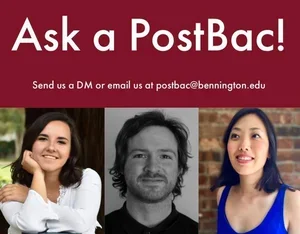A Veterinarian Perspective
As Bennington College’s Postbac Premedical Program celebrates its 40th anniversary this year, Eileen Wilentz ’73 postbac ’85 reflects on the role Bennington’s program played in her pursuit of her Doctorate in Veterinary Medicine.

When Eileen Wilentz ’73 postbac ’85 was in elementary school, she was given the assignment to write a book about her life and her ambitions. The last entry was, “I want to be a veterinarian.”
“I had that in my head growing up, but coming of age in the 1960s, the sciences didn’t seem as relevant as social science and politics,” said Wilentz. “My family was not science oriented at all. So I got channeled toward liberal arts and social science studies.”
As it turned out, Bennington College became the foundation for Wilentz’s initial higher educational endeavors, and the place where she later switched tracks. As an undergraduate student at Bennington, she studied Social Science, going on to pursue a graduate degree in History at Columbia University in 1976.
The decision to re-enroll in Bennington’s postbac program was “part of that reevaluation of life one does when you hit thirty,” said Wilentz. “I felt like I needed a profession, something that had a focus. And I found I was good at science.” Friends who had also pursued careers in veterinary medicine later in life were also encouraging, helping her make the decision to go back to school.
As a postbac pre-med student, Wilentz found renewed focus in her educational pursuits.
“One thing about postbac education is that that you have a much better focus on what you really want and how to get the most out of what you are doing,” said Wilentz. “You have a goal when you are doing your postbac. As an undergrad, I had direction, but certainly not the focus I had going back as an older student. A lot of people do a postbac program fairly soon after graduating college, but I went back ten years later.”
As Wilentz worked to get her resume together for veterinary school applications, she spent her winter Field Work Term taking additional classes through the SUNY system, as well as riding with local veterinarians doing farm calls and working on a local horse farm.
“It is easy to get experience with small animals these days, but at that point, veterinary schools wanted to see on your resume that you’d worked at farms,” said Wilentz. “It helped give a better appreciation of all aspects of the profession. I had previously worked at a small animal clinic in Virginia, so I rounded out my resume with Field Work Term experiences. After being in practice several years, I taught one semester at a vet tech school, and I asked the students to spend a day shadowing at a clinic to ensure they had an accurate picture of the work of a veterinarian and a veterinary technician. To be a vet, it is not enough to just love animals—it’s not all cuddling and kittens. It is a demanding job, and having an appreciation of that is important. It may have been my Field Work Term experiences that inspired my inclusion of this requirement.”
After graduating from Bennington’s Postbac Premedical Program, Wilentz earned her Doctorate in Veterinary Medicine from Cornell University. She has since spent her career working as a veterinarian throughout Canada and the Northeast, primarily in Connecticut.
While Bennington has changed since Wilentz graduated from the program, its ultimate aim to bridge the gap for students looking to pursue medical fields has remained the same.
To prospective and current postbac students, Wilentz advises them to “stay focused on your goal, whether that’s human medicine or another field.”
“I always thought school was fun—it’s a way to get somewhere, the information is interesting, and everybody is pursuing the same goal,” said Wilentz. “So keep your focus, because this is what you have decided to do.”
By Natalie Redmond, Associate Writer